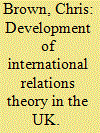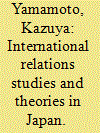|
|
|
Sort Order |
|
|
|
Items / Page
|
|
|
|
|
|
|
| Srl | Item |
| 1 |
ID:
103996


|
|
|
|
|
| Publication |
2011.
|
| Summary/Abstract |
The development of International Relations theory (IRT) in China has been framed by three debates since 1979. The first was about China's opening up to the outside world. It started with the question of whether the world was characterized by 'war and revolution' or 'peace and development' between orthodox and reformist scholars and continued to focus on China's interest between orthodox scholars and the newly rising Chinese realists. It resulted in a wide acceptance of the reformist argument that peace and development characterized our era and of the realist view that China was a normal nation-state and should have its own legitimate national interest. The second started in the early 1990s and centered on the better way of realizing China's national interest. It was between Chinese realists and liberals. While the former emphasized national power, the latter proposed the alternative approach of international institutions. The third debate was on China's peaceful rise. It evolved at the turn of the century, when all the three major American IRTs, realism, liberalism, and constructivism, had been introduced into China and therefore the debate was more a tripartite contention. Realists believed that it was impossible for any major power to rise peacefully, while liberals and constructivists both supported the peaceful-rise argument. Liberals stressed more the tangible benefits derived from international institutions and constructivists explored more China's identity in its increasing interaction with international society. Although it was Chinese constructivists who explicitly discussed the identity issue, all the three debates and all the debating sides have reflected this century puzzle since the Opium War - China's identity vis-à-vis international society. These debates have helped push forward the IRT development in China and at the same time established Western IRT as the dominant discourse. A new round of debate seems likely to occur and may center on the question of the world order. This time it may help the newly burgeoning but highly dynamic Chinese IRT to develop and contribute to the enrichment of IRT as knowledge of human life.
|
|
|
|
|
|
|
|
|
|
|
|
|
|
|
|
| 2 |
ID:
103999


|
|
|
|
|
| Publication |
2011.
|
| Summary/Abstract |
British International Relations (IR) theory is distinguished by a concern with institutions and norms, and by an emphasis on history, philosophy, and law rather than the formal methods of the social sciences; in both respects, but especially the latter, it differs from American IR theory. The origins of British IR theory are traced, and the importance of the 'English School' (ES) is stressed, partly because of the work it stimulates, but also because of its role as a brand which helps to establish the independence of British IR from the otherwise dominant American profession. Along with ES scholarship (pluralist and solidarist), political theory and IR, and critical theory, including critical security studies, are the major areas where contemporary IR theory in Britain is located. This is likely to persist, but the generally critical approach taken to social scientific theorizing may be changing, with the increasing importance of historical sociology and critical realist work. It may also be the case that the privileged status of IR theory in British IR may be under challenge.
|
|
|
|
|
|
|
|
|
|
|
|
|
|
|
|
| 3 |
ID:
103997


|
|
|
|
|
| Publication |
2011.
|
| Summary/Abstract |
A common view of Japan's International Relations (IR) studies in the post-World War II period is that they are characterized by pacifism and historical approaches. This paper argues that while pacifism has continued to serve as the basis of them, the approaches adopted by researchers have become increasingly diversified. Specifically, although the main issues for Japanese IR studies in the postwar period (i.e. defense strategy, world political economy, and global issues) have been consistently addressed by researchers on the basis of pacifism, the theoretical orientation of researchers has continually become stronger. Finally, this paper argues that both changing and continuous characteristics of IR studies in Japan have been supported by global developments, and concludes that this trend will continue into the near future.
|
|
|
|
|
|
|
|
|
|
|
|
|
|
|
|
| 4 |
ID:
103995


|
|
|
|
|
| Publication |
2011.
|
| Summary/Abstract |
This article investigates and explains the development of International Relations studies (IRS) in China, Japan, and India. Beginning in early 1980s IRS experienced exponential growth in China and is becoming a separate discipline in that country. Despite early starts, IRS in Japan and India is still an appendage in other disciplinary departments, programs, and centers although growing interest is discernible in both countries. Continued rise of Asian powers along with their growing roles and responsibilities in constructing and managing regional and global orders is likely sustain and increase interest in IRS in these countries and more generally in Asia. Distinctive trajectories have characterized the development of IRS in China, Japan, and India. Distinctiveness is evident in master narratives and intellectual predispositions that have shaped research and teaching of IR in all three countries. The distinct IRS trajectories are explained by the national and international context of these countries as well as the extensiveness of state domination of their public spheres. Alterations in national circumstances and objectives along with changes in the international position explain the master narratives that have focused the efforts of IR research communities. Extensiveness of state domination and government support, respectively, explain intellectual predispositions and institutional opportunities for the development of IRS. IRS in Asia has had a predominantly practical orientation with emphasis on understanding and interpreting the world to forge suitable national responses. That orientation contributed to a strong emphasis on normative-ethical dimensions, as well as empirically grounded historical, area, and policy studies. For a number of reasons including intellectual predispositions and constraints, knowledge production in the positivist tradition has not been a priority. However, IR theorizing defined broadly is beginning to attract greater attention among Asian IR scholars. Initial interest in Western IR theory was largely a function of exposure of Asian scholars to Western (primarily American) scholarship that has been in the forefront in the development of IR concepts, theories, and paradigms. Emulation has traveled from copying to application and is now generating interest in developing indigenous ideas and perspectives based on national histories, experiences, and traditions. Although positivism may gain ground it is not deeply embedded in the intellectual traditions of Asian countries. Furthermore, theorizing in the positivist tradition has not made significant progress in the West where it is also encountering sharp criticism and alternative theories. Asian IR scholarship would continue to emphasize normative-ethical concerns. And historical, area, and policy studies would continue to be important in their own right, not simply as evidentiary basis for development of law-like propositions. It also appears likely that Asian IR scholarship would increasingly focus on recovery of indigenous ideas and traditions and their adaptation to contemporary circumstances. The net effect of these trends would be to diversify and enrich existing concepts, theories, methods, and perspectives, and possibly provide fresh ones as well. The flourishing of IRS in Asia would make the IR discipline more international.
|
|
|
|
|
|
|
|
|
|
|
|
|
|
|
|
| 5 |
ID:
103998


|
|
|
|
|
| Publication |
2011.
|
| Summary/Abstract |
There are many stories to be told regarding the development of International Relations (IR) theory in the United States over the last century. Some have pointed out IR's evolutionary properties, emphasizing the debates that have produced fitter theory with empirical reality. Others have argued that the development has been largely scientific with knowledge built hierarchically through time. In this article, I propose an alternative view of American IR's development. Specifically, I argue that IR theory is best understood through heterarchical organization, with core ideas and concepts rerepresented in new ways, and various levels of analysis, over time. In making this argument I trace duel processes of borrowing ideas from other disciplines and rerepresenting those ideas in new forms in order to solve vexing theoretical problems. The article demonstrates how conceptions of anarchy have been significantly affected by other disciplines and relates those conceptions to views of international security both at home and abroad, particularly in the Asia-Pacific region.
|
|
|
|
|
|
|
|
|
|
|
|
|
|
|
|
|
|
|
|
|